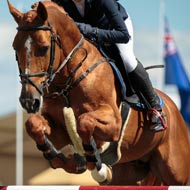FEI lifts suspensions on Guerdat and Bichsel

Scientific evidence presented by the athletes suggests the likelihood of food contamination.
The provisional suspensions on Swiss Jumping riders Steve Guerdat and Alessandra Bichsel have been lifted following preliminary hearings at the end of last week.
The FEI Tribunal say their decision is based mainly on scientific evidence presented by the athletes which suggests the likelihood of food contamination.
Both riders were provisionally suspended after their horses on which they were competing tested positive for prohibited substances, including banned substances.
Samples taken in May from Guerdat's horses, Nino des Buissonnets and Nasa, tested positive for the banned substance codeine and the controlled substance, morphine. Both horses also revealed traces of the banned substance oripavine, however there was not enough in Nasa's sample to declare a positive.
Likewise, samples taken the same month from the horse Charivari KG, ridden by Alessandra Bichsel, also returned positive for codeine, oripavine and morphine.
The FEI held preliminary hearings via teleconference at the end of last week (Thursday 23 July and Friday 24 July) to hear the athlete's request to lift the provisional suspensions.
Although the tribunal lifted the provisional suspensions on the two riders, requests for the lifting of the provisional suspension on the three horses were denied. The tribunal found that irrespective of the source of the prohibited substances, banned substances had been found in the system of the horses and it is the FEI's policy to impose a provisional suspension period of two months in such cases.
Decisions on the merits of the cases will be made at a later stage.



 The Veterinary Medicines Directorate (VMD) is inviting applications from veterinary students to attend a one-week extramural studies (EMS) placement in July 2026.
The Veterinary Medicines Directorate (VMD) is inviting applications from veterinary students to attend a one-week extramural studies (EMS) placement in July 2026.